Grasses, seeds, weeds, vegetables, fruits, insects, worms, slugs, and even table scrapes; being omnivorous, chickens have a diverse diet. It takes the stress of feeding a well-rounded diet to chickens off the shoulders of people who have them. If we talk only about fruits and vegetables, chickens eat apples, blueberries, strawberries, watermelon, broccoli, lettuce, beets, carrots, Swiss chard, cucumbers, pumpkins, squash, and much more. But can chickens eat cabbage?
Whether raw or cooked, cabbage is an excellent addition to your chicken’s diet. It contains adequate nutrients, and chickens generally like to eat it. In this article, we will talk about chickens and cabbage.
Table of Contents
Can Chickens Eat Cabbage?
The answer is yes. Just like rabbits, chickens can eat cabbage in both raw or cooked form.
Cabbage is a cruciferous vegetable that belongs to the same family as cauliflower, broccoli, kale, and radishes. It is a nutrient-packed treat for the chickens. However, there are many kinds of cabbage, each having its own nutrient profile.
For instance, purple cabbage has more vitamin A than green cabbage, but all varieties are safe for chickens.
From green cabbage to purple or red cabbage, savoy cabbage to Napa cabbage, Bok Choy to Choy Sum, any variety of cabbage will be a great addition to your chicken’s diet.
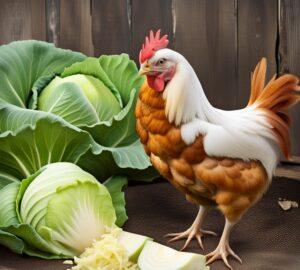
Can We Give Cabbage to Baby Chicks?
Baby chicks can eat anything, which chickens eat, but not in similar quantities. Baby chickens do not have digestive systems as robust as fully-grown chickens. Hence, you should give them adult snacks only when they reach six weeks of age.
Furthermore, it might be difficult for baby chicks to eat raw cabbage. The best way is to boil and chop it into smaller pieces that are easy to peck and swallow.
The Nutrient Profile of Cabbage
Cabbage is full of vitamins and minerals needed for optimal health. It keeps the body healthy and strong and improves the quality of eggs.
100 grams of green cabbage contains:
| 1.28 grams of protein |
| 2.5 grams of fiber |
| 0.124 mg of Vitamin B6 |
| 36.6 mg of Vitamin C |
| 76 mg of Vitamin K |
| 43 mcg Folate |
| 40 mg Calcium |
| 0.16 mg Manganese |
| 12 mg Magnesium |
| 26 mg Phosphorus |
| 170 mg Potassium, polyphenols (antioxidants), and traces of iron, vitamin A, and riboflavin. |
Cabbage has good fiber content along with water. Beyond the shadow of a doubt, cabbage has a nutrient-rich profile and is one of the best foods to give to your chickens.
Health Benefits of Cabbage for Chickens
There are an array of health benefits of cabbage for chicken. Here are a few:
It improves the digestive system
Cabbage is rich in fiber, and fiber helps in improving digestive health. The insoluble-fiber content in cabbage is very high, which promotes bowel movements.
Furthermore, cabbage is also rich in soluble fiber. It helps beneficial bacteria to flourish in the gut of the chickens.
These bacteria improve their immunity and produce vitamins such as B12 and K2.
It prevents inflammation
Cabbage helps in preventing chronic inflammation. It is rich in antioxidants, which help in reducing chronic inflammation.
It boosts collagen production
Cabbage contains Vitamin C, a water-soluble vitamin that fuels collagen formation. Collagen is behind the structure and flexibility of the skin and aids the functioning of bones, blood vessels, and muscles.
It is rich in antioxidants
Not just humans, chickens also need antioxidants, and cabbage is a diet full of antioxidants.
It has Vitamin C, which works as a robust antioxidant and shields the body from the harmful effect of free radicals.
Both green and red cabbage are laden with antioxidants, but red cabbage has 30 percent more antioxidants than green cabbage.
It contributes to heart health
Anthocyanins, present in red cabbage, are linked to better heart health. Some studies have shown that these compounds are essential for maintaining optimum heart health.
Cabbage contains more than 36 types of anthocyanins. Giving 10 mg of red cabbage to your chicken every day can help lower the susceptibility to heart disease by five percent.
It reduces cholesterol
Similar to humans, a high amount of cholesterol in the body can also compromise the health of chickens.
The soluble fiber and plant sterols (phytosterols) in cabbage help in keeping bad cholesterol or LDL in check.
Which Part of Cabbage Should Chickens Eat?
Now comes the important question; which is the best part of cabbage for chickens? Can chicken eat cabbage leaves? Can they eat the hard stem of the cabbage?
Well, chickens can eat the whole cabbage, except the hard stem and core. It is best to give your chickens cabbage leaves to meet their dietary requirements for maintaining good health.
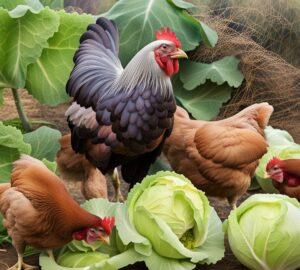
What Type of Cabbage Should Chickens Eat?
Another question that floods the minds of most people is- can chickens eat purple cabbage? Which is the best type of cabbage for chickens, red or green? Is it better to give them raw cabbage or cook it before serving?
Read further to know all the answers.
But first, can chickens eat purple cabbage? Yes, of course.
Chickens can eat purple cabbage. Purple cabbage or red cabbage is an excellent source of fiber, vitamins, and minerals. It has ten times more vitamin A and 30 percent more vitamin C than green cabbage. It is safe to feed red cabbage to your chickens.
Now, can chickens eat raw cabbage?
Of course, they can. Raw cabbage is a more refreshing snack during the summer months. It is better to refrigerate the cabbage for a few hours before serving them to your flock.
However, make sure you don’t serve raw cabbage to baby chicks. It is always better to give them cooked chicken.
Another question, can chickens eat cooked cabbage?
Yes, they can. Boil or steam the cabbage for your chicken. However, when it comes to food scraps, the world is divided. Some say giving leftover cabbage to chickens is fine, while others reject the idea.
The reason is the presence of seasoning. As chickens do not need salt in their diet, giving them cabbage seasoned with a high amount of salt can be harmful.
How Often Should Chickens Eat Cabbage?
When it comes to the quantity and frequency of serving cabbage to your flock, moderation is the key. It is ideal to serve chicken in a moderate amount.
Any green leafy treat should not exceed 10 percent of the chicken’s diet. A complete diet should have 90 percent chicken feed and 10 percent treats.
Furthermore, giving them cabbage very frequently can enhance the chances of obesity. Hence, do not serve them cabbage every day, and worse, every meal.
Giving them cabbage very often can cause health issues.
Health Risks Associated with Cabbage
Cabbage is a superfood for chickens, given you feed them in moderation.
Goitrogenic agents in cabbage and other food items like broccoli, turnip, rapeseed, soybean, and flax can lead to health issues like avian goiters, immune deficiency, reproductive problems, etc.
It can also cause diarrhea, leading to dehydration in chickens. Furthermore, giving rotten cabbage to your chickens can also harm their health.
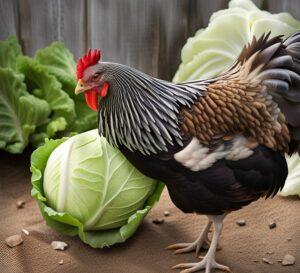
Things to Keep in Mind Before Giving Cabbage to Your Chicken
By now, it is a known fact that chickens love cabbage. But, there are a few things for you to keep in mind before you serve them their favorite treat to ensure that they enjoy it to the core.
Here are a few things to keep in mind before giving cabbage to your chicken:
Cleaning
Wash the cabbage thoroughly before serving it to your chickens, especially if you have store-bought cabbage. More often than not, store-bought cabbages contain harmful herbicides and pesticides.
It is necessary to wash the cabbage to remove the cover of harmful chemicals from it. Failing to do so can make your chickens sick. Furthermore, if you spray pesticides on home-grown cabbages, wash them the same way.
Avoid stale cabbage
Never feed moldy cabbage to your chicken. If the cabbage is smelling bad or is about to rot, throw it right away. Mold can harm the health of your chickens.
Snack
Treat cabbage as a treat instead of a complete meal. A complete meal comprises 90 percent chicken food and 10 percent treat. Disperse this treat evenly throughout the week to ensure your chicken gets a balanced diet. Provide chicken grit to your chicken along with treats to aid the breakdown of food in the gizzard.
Cabbage activity
Chickens might not eat an entire cabbage. In most instances, they leave the cabbage that is hard to peck. In that case, try hanging the whole cabbage in the run or yard. Y
our chickens may peck at it to kill boredom. It will keep their interest and fill their bellies. It is applicable if you intend to use cabbage as an activity.
Small bites
For meals, make sure you chop the cabbage into peck-sized bites. Your chickens might lose interest in cabbage if it is hard to peck. However, when giving cooked cabbage, do not chop it. Cooked cabbage is soft and easy to eat. Your chickens will not find it tough to peck.
Distribution
Generally, weaker chickens do not get as much food as stronger chickens that run and grab their food. If you have a large flock with weak and strong chickens, make sure every chicken gets their portion of food.
One way to ensure it is by spreading the portions throughout the yard instead of piling them in one place. Having separate portions will allow weaker chickens to get their part of the food.
To Eat and Not to Eat
By now you have answers to:
- can chickens eat cabbage
- should they eat cooked or uncooked cabbage
- can chickens eat cabbage leaves
Now, which is the best type of cabbage for them is the bonus we have for you.
Listed below are foods other than cabbage that your chicken should and should not eat.
What can Chickens Eat?
Fruits
The best food to give to your chicken is fruit. They are rich in vitamins, minerals, and antioxidants that support the overall health of chickens.
From watermelons to berries, apples to bananas and figs- give fresh fruits to your chickens.
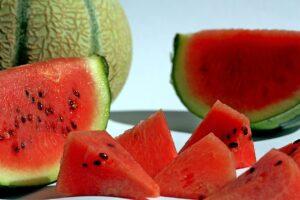
Vegetables
Apart from cabbage, other cruciferous vegetables like Swiss chard, kale, and broccoli are a great source of nutrients.
Grains
Corn, oats, wheat, etc., are energy powerhouses. They make up for a fabulous diet for chickens.
What Not to Eat
Raw Beans
Raw or uncooked beans are dangerous for the health of chickens. Giving raw beans to them can cause health issues and death if not attended on time. On the other hand, cooked beans are not harmful.
Avocado
A fungal toxin, persin, present in the skin, stone, or pit can lead to health problems like diarrhea and vomiting. Taking it in high amounts can even cause death.
Tomato and Eggplant
Solanine, an alkaloid, in pepper, tomatoes, and eggplant leaves, can raise health concerns in chickens.
Green or Sprouting Potatoes
Green potatoes are toxic due to the presence of solanine in their tissue. Make sure you feed ripe potatoes to your chickens. However, the nutritional value of potatoes is not very significant. Try sweet potatoes instead, as they are packed with nutrients.
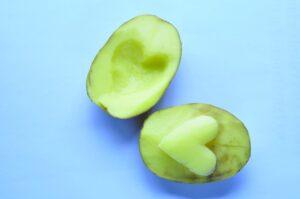
Tea or coffee
Coffee, tea, and chocolates contain harmful elements that cause health issues in chickens.
Final Thoughts
To ensure that your chickens have optimum health, giving a balanced diet to them is paramount. Adding cabbage to their diet is a sure-shot way of assuring that your chickens receive all the essential vitamins and minerals.
If you are considering adding cabbage to your chickens’ menu, go ahead. It is a great option to fill your chickens with all the essential nutrients and keeps them healthy. However, make sure you keep track of the amount of cabbage your chickens are having.




























